Award Winners
Meet our 2018 Global Synergy Research Grant recipients. These outstanding Purdue Liberal Arts faculty are advancing their disciplines by their commitment to their research and passion for change.
The Global Synergy Research Grant provides support for these types of projects:
-
research proposed in collaboration with an individual faculty member at an international institution
-
collaborative projects among faculty in the liberal arts at Purdue partnering with faculty at an international institution
-
collaborative projects at the institutional level that involve the College of Liberal Arts at Purdue University and an international institution
2018 Purdue Liberal Arts Faculty
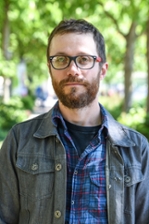 Andrew Flachs, is an assistant professor in the Department of Anthropology
Andrew Flachs, is an assistant professor in the Department of Anthropology
Professor Flachs received the 2018 Global Synergy in Research faculty award for his project: "Preserving Probiotics: Biocultural links between the Human Gut Microbiome and Fermented Foods"
Human bodies teem with trillions of microbes, a complex assemblage of bacteria, eukaryotes, and viruses essential for human health and wellbeing. This microbiome is the result of the foods we eat and the places where we live, but humans are not passive in our environments: we domesticate species, change habitats, and process foods in ways that have distinctive and synergistic effects on microbial communities. By consuming probiotic bacteria, humans can modify the microbiome within our guts to reap substantial health benefits ranging from neurological function to immune response. The keys to understanding the interactions between fermentation and the gut microbiome lie in the processes and technologies by which foods are fermented – a cultural as well as biological question of microbial activity, diet, fermentation practices, and local culinary traditions. In this project, we combine research strategies from biology, genetics, and cultural anthropology to investigate how local knowledge and cultural practices associated with fermented food production directly impact microbial communities within ourselves.
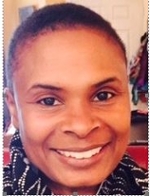
Professor Gallon received the 2018 Global Synergy in Research faculty award for her project "Decolonizing Design: Increasing Adult Ghanaian Women’s Education Through Online Distance Education"
Technology has come to define how education is delivered to people across the globe. Still, little attention has been paid to the role culture and gender plays in the design, implementation and adoption of online education in Africa. "Decolonizing Design: Increasing Adult Ghanaian Women’s Education through Online Distance Education" is inspired by former First Lady, Michelle’s Obama’s initiative, Let Girls Learn and its goal to develop education for girls in Africa. In contrast, this project focuses on adult Ghanaian women’s education. While a fair amount of attention has been focused on girls' education in Africa, less consideration has been given to educational opportunities for women. Globally, adult women are viewed as uniquely suited to online education programs.. Citing factors such as work and family commitments, women reference greater flexibility and convenience as reasons they choose to enroll in online programs. In developing parts of the world, online education holds even greater potential to provide schooling and training to women who have been traditionally shut out of educational institutions due to familial obligations, gender restrictions on mobility and their location in remote, rural locations that prevent them from attending traditional in-person classes.This project draws on the expertise of Dr. Olivia Kwapong (University of Ghana) to evaluate the experiences of adult Ghanaian women enrolled in online education at the University of Ghana. The Global Synergy Award will be used to conceptualize an African feminist online distance education support system for Ghanaian women. Without intentional gender consciousness at all levels of online education design and development, adult Ghanaian women will be unlikely to enroll and matriculate in various University programs. Moreover, African cultural identity and the history of European imperialism in Ghana suggests that the design of online education must also be culturally-specific and reflect a deep understanding of the historical factors that have posed obstacles to women's education. In this sense, online education must also account for the cultural disruption caused by British colonialism and the neocolonial forces that currently reside throughout Ghana. Overall, this project reflects my emerging scholarly profile as historian who is also an instructional designer and e-learning developer and is focused on women’s education in West Africa. As an avowedly interdisciplinary scholar, I am committed to demonstrating how scholarship can be enhanced by refusing to be confined to disciplinary conventions and boundaries.
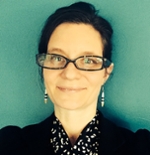 Laura Zanotti, is an Associate Professor in the Department of Anthropology
Laura Zanotti, is an Associate Professor in the Department of Anthropology
Professor Zanotti received the 2018 Global Synergy in Research faculty award for her project: "Biocultural Landscapes: Indigenous Rights and Conservation at Belem +30"
The goal of the project is to support knowledge exchange amongst indigenous leaders, scholars, and leading scientists to pursue solutions to the rapid loss of global biocultural diversity to address food, water, and energy security and create digital collaborative spaces for scholars, indigenous leaders, and scientists to share latest-breaking observations on biocultural loss.
Background: In 1988, anthropologist Darrell Posey organized first International Society for Ethnobiology (ISE) meetings in Belém, Brazil, which gathered together a global federation of scientists, scholars, activists, and indigenous leaders with mutual interests in valuing Indigenous knowledge systems. At the time, Posey was a researcher at Brazil’s premier research institute, the Goeldi Museum, where in the previous decades he worked closely with the Kayapó. The Kayapó peoples govern of one of the largest intact forest neotropical landscapes in the world and are central political actors in Brazil who address twentieth century grand challenges of human rights, climate change, and deforestation. In 2018, the thirtieth anniversary of the ISE meetings will once again be held in Belém, Brazil. GSR funding will support the travel costs and conference costs for several indigenous leaders, elders, and youth to present at and engage with scholars and policymakers at the thirtieth anniversary of the ISE meetings. The ISE is a critical space to push for an overall paradigm shift in conservation that consists of a move toward biocultural diversity and rights-based approach, both of which have become centerpieces at sites of global environmental governance during this time of socio-environmental crisis.
2018 Purdue Liberal Arts Students
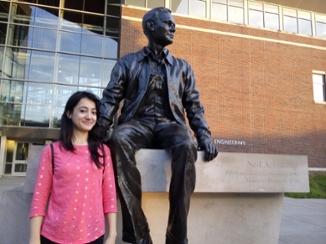 Humera Dinar, Department of Anthropology
Humera Dinar, Department of Anthropology
Graduate student Dinar received the 2018 Global Synergy in Research student award for her project: "Development and Marginalization in Northern Pakistan"
My research project is an ethnographic study that investigates the forms of marginalization and exclusion produced by the state fostered large-scale infrastructure projects and policies in Gilgit-Baltistan, the northern frontier region of Pakistan. Gilgit-Baltistan is a rural, mountainous territory located at the borders of Pakistan, India, China, and Afghanistan. However, this region has a strategic significance in the geo-political and economic spheres of Pakistan. Therefore, the state of Pakistan has been striving to solidify its claim in this territory, and one of the main political tactics being used is the development narrative and the policies of the state, which have been important tools to appropriate the state-space and assert control over the territory. Roads have always been central to the design of modern nation-state. Therefore, the development era of this region begins with the construction of the Karakoram Highway (KKH) in the 1970s that connected this region to the rest of the country. These state-initiated social engineering projects are remarkable tools of modern statecraft. However, the impacts of such development projects need to be studied academically to understand and bring forth the local counter-narratives of development.
The state of Pakistan has adopted an implicit integrative policy in the form of development projects to keep its borderland territories such as Gilgit-Baltistan connected to its national sphere. Since the last quarter of the twentieth century the infrastructure development, educational programs, health initiatives, local businesses, employment opportunities in public and private sectors, have contributed towards an overall improvement in the quality of life, health, literacy rate, income opportunities as compared to the circumstances before these interventions. However, there is a need to acknowledge regional variations and the embedded forms of marginality across gender and ethnic groups. Also important is to see how the status and role of women in the society has been affected during the last three decades.
Therefore, my project aims to analyze how the infrastructure projects such as roads have changed the physical space which in turn have remapped the local and reoriented gender power relations in economic and political spaces. Another goal is to recommend strategies to frame an inclusive development plan that acknowledges and addresses heterogeneities within women and geographic cores and peripheries.
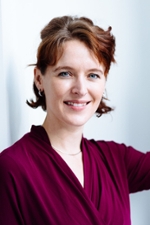 Jessica Eise, Brian Lamb School of Communication
Jessica Eise, Brian Lamb School of Communication
Graduate student Eise received the 2018 Global Synergy in Research student award for her project: "Climate Change Adaption in Colombia's Coffee Axis: Assessing Communicative Needs of Agricultural Producers"
Climate change disproportionately affects developing countries where agriculture is essential for economic stability and food security. Colombia is particularly vulnerable as their unique geography makes them extremely susceptible to the impacts of climate change.
This project will assess climate change attitudes, beliefs and information needs of agricultural producers in Risaralda, Colombia, to develop co-constructed behavioral change campaign messages that are tailored to the local community. The study is designed to assess the climate change attitudes and beliefs of coffee farmers in Columbia in two waves to develop an educational campaign matched with farmers’ beliefs about the best approach for applying United Nations Development Programme (UNDP) recommendations for climate change mitigation and prevention.
The goal of the first research wave is to determine how the coffee producers themselves articulate their needs and what they believe to be the most effective ways for them to learn about and potentially implement climate change adaptation and mitigation. The goal of the second wave of data collection is to learn how the coffee producers themselves propose resolving the issues they originally identified when reflected back to them in generalized findings.
This project will deliver three results, which are (1) a scholarly article compiling the findings, (2) a public-facing document in both Spanish and English for stakeholders’ use that summarizes findings in audience-appropriate language and (3) a visit by our international collaborators to Purdue’s campus to conduct a seminar.
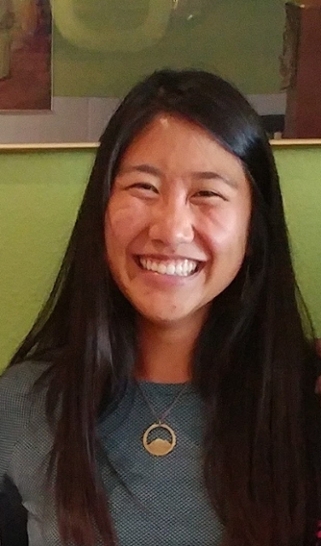
Graduate student Huang received the 2018 Global Synergy in Research student award for her project: "If we can't grow rice, then what?": Remaking Agroecological Livelihoods in Vietnam's Mekong Delta"
This proposed anthropology study aims to provide an ethnographic picture of how discourses about food security impact the attitudes, values, practices, and meaning-making in the everyday experiences of rice farmers responding to food insecurity in the Mekong River Delta region of Vietnam.
This project uses a feminist political ecology and feminist science and technology studies framework to explore the intersectional facets of livelihood construction, specifically focusing on how farmers negotiate their attitudes and practices within national discourses of a food secure livelihood. While it is widely recognized that addressing global food insecurity requires a commitment to global agricultural production, meeting nutritional goals, and providing access to foods, more research is needed on the evolving nature of how these projects aimed to address food insecurity are enacted in the daily lives of farmers.
This research project will analyze these interactions between national discourses that shape and legitimize food security projects across the Mekong River Delta and how these discourses are embodied in the everyday strategies of rice farmers to address their own food insecurity. Food security is conceptualized as a component in the development of a good life and is analyzed through three main themes: as a livelihood, as knowledge and technology, and as a discourse.
This long-term ethnographic study is designed to provide a systematic exploration into the disconnections between how countries aim to address food insecurity and how food insecure communities embody, resist, or transform those policies into everyday lived practices. This research combines the methods of participant observation, semi-structured interviews, household surveys, and participatory mapping.
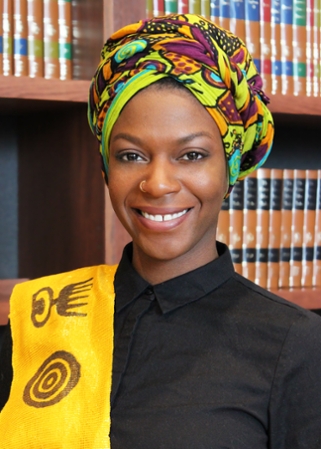
Graduate student Taylor-Watson received the 2018 Global Synergy in Research student award for her project: "Transnational Material Culture: African Print Cloth, Cultural Exchange, and Gendered Identity"
Textiles are one of our world’s most essential commodities and they can tell us so much about the histories of peoples and societies. Not only do they offer a glimpse into the cultures that produced them, they also provide insight about the development of commercial networks, language communities, trade and consumption, and gendered labor contexts. In the lives of African women textiles have shaped their identities through their materiality, design, and circulation. For Ghanaian women specifically textiles have had a history of indicating status, spirituality, and prosperity.
While most of the cloth in Ghana has been woven in local villages, after European colonialism there was an increase in printed fabric referred to contemporarily as African print cloth or Dutch wax. Although this cloth is designed and produced outside of Ghana, women reclaim Dutch wax print through the process of naming that evoke memories and expectations of womanhood associated with their everyday lived experiences.
Today the circulation of African Print cloth has become a valued commodity not only in Africa but also within the United States and has paved the way for informal African fashion networks that link African diasporic communities. Where historically African diasporic communities were excluded from the global capital market as producers, African cloth and fashion has become a space where they could enter presenting many women with opportunities to make a living.
My Global Synergy Grant connects me with a distinguished Archaeological professor at the University of Ghana to observe and investigate how African print cloth uncovered in archeological digs can shed light on the historical lives of Ghanaian women in Accra and provide insight into the cultural significance of African print cloth for contemporary meanings of Ghanaian womanhood.